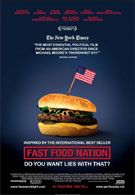If Morgan Spurlock’s Super Size Me didn’t make you lose your appetite, then wait until you see the extended cow slaughter scene at the end of Fast Food Nation. This grueling climax—which reinforced my decade-long decision to “just say no” to meat—exists solely to induce nausea, and on that level, it passes with flying colors. The trouble is that, ultimately, Richard Linklater’s new film is as messy as the factory floors laced with cow guts.
It was never a good idea to take Eric Schlosser’s gripping page turner and adapt it into a fictional movie with intertwining stories, a la Crash. His book, a gripping exposé of inconvenient truths within the food industry, packs a mean punch without ever straining to be important; it just is. In contrast, Linklater’s film adaptation of Fast Food Nation, which he co-wrote with Schlosser, tries to accomplish so many things that it barely accomplishes anything.
For starters, there are far too many characters: Wilmer Valderrama, Ana Claudia Talancón, and Catalina Sandino Moreno play young Mexicans who illegally cross the border to work in a Colorado meatpacking factory; Greg Kinnear is the VP of Marketing for a fast-food chain named Mickey’s (real subtle), who learns there is feces in the hot-selling burger “The Big One”; and Ashley Johnson and Paul Dano are confused high school students who earn extra cash at Mickey’s in their free time. On top of that, add Patricia Arquette as a scantily-clad mom, Ethan Hawke as a liberal-minded dad, Bobby Cannavale as a supervisor with a knack for sexual harassment, cameos from Bruce Willis, Kris Kristofferson, Avril Lavigne…and so forth.
Fast Food Nation has a major clutter problem, and it prevents us from ever really knowing the people, let alone caring what becomes of them. Linklater is a talented writer (Before Sunrise, Dazed and Confused) but this script is dreadfully undeveloped and lacking his typically-clever inputs. Instead, he aims to make an unapologetic ‘message’ movie: in a scene where a group of students gather to discuss freeing the cows, a conversation about helpless bovines segues, out of nowhere, into terrorism and the Patriot Act. There is no focus here—just random bouncing from one unknown character to the next, one arbitrary political topic to another.
While it’s hard to bash a movie with such good intentions, it’s equally as difficult to offer any real reason to see it. Fast Food Nation is never as powerful as a single page in Schlosser’s book—you can almost taste the missed opportunities—but instead of a hearty feast, all we’re fed are empty calories.
Most Popular




